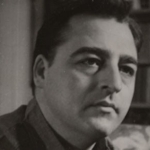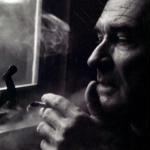The sleds of the children
Move down the right slope.
To the left, hazed in the tumbling air,
A thousand lights smudge
Within the branches of the old forest,
Like colored moons in a well of milk.
The sleds of the children
Make no sound on the hard-packed snow.
Their bright cries are not heard
On that strange hill.
The youngest are wrapped
In cloth of gold, and their scarfs
Have been dipped in blood.
All the others, from the son
Of Tegos, who is the Bishop
Of Black Church—near Tarn,
On to the daughter of the least slut,
Are garbed in love's shining dress;
Naked little eels, they flash
Across the amazed ice.
And behind each sled
There trots a man with his sex
Held like a whip in his snaking hand.
But no one sees the giant horse
That climbs the steps which stretch forth
Between the calling lights and that hill
Straight up to the throne of god.
He is taller than the highest tree
And his flanks steam under the cold moon.
The beat of his heart shakes the sky
And his reaching muzzle snuffles
At the most ancient star.
*
The innocent alone approach evil
Without fear; in their appointed flame
They acknowledge all living things.
The only evil is doubt; the only good
This I thought as I stood while the snow
Fell in that bitter place, and the riders
Rode their motionless sleds into a nowhere
Of sleep. Ah, God, we can walk so easily,
Bed with women, do every business
That houses and roads are for, scratch
Our shanks and lug candles through
These caves; but, God, we can't believe,
We can't believe in anything.
Because nothing is pure enough.
Because nothing will ever happen
To make us good in our own sight.
Because nothing is evil enough.
*
I squat on my heels, raise my head
To the moon, and howl.
I dig my nails into my sides,
And laugh when the snow turns red.
As I bend to drink,
I laugh at everything that anyone loves.
All your damn horses climbing to heaven




















Comment form: